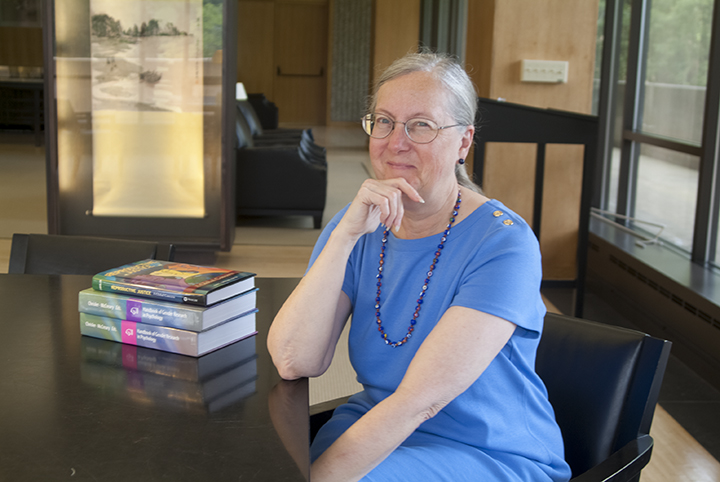Joan C. Chrisler, Ph.D., The Class of ’43 Professor of Psychology, Connecticut College, and Editor of SMCR’s journal Women’s Reproductive Health
 When and/or why did you join the Society for Menstrual Cycle Research?
When and/or why did you join the Society for Menstrual Cycle Research?
I joined the Society in 1981 and attended my first conference that summer at the suggestion of Sharon Golub, an SMCR board member whom I met at an Association for Women in Psychology (AWP) conference. Sharon had taken an interest in my dissertation research which concerned creative thinking across the menstrual cycle. I was impressed by the interdisciplinarity of the SMCR conference program, the friendliness of the attendees, and the presence of women’s health activists. I consider SMCR and AWP my most important scholarly “homes.”
How did you become interested in doing menstrual cycle research?
My doctorate is in general experimental psychology. I was particularly interested in social psychology and physiological psychology (now part of neuroscience), and was looking for a topic that combined both. As a feminist activist, I thought it would be great to work on the psychology of women. In the library one day, flipping through dusty old volumes of Psychological Abstracts, I found some menstrual cycle research, which I soon realized was the perfect topic for me. This led to my master’s thesis on “Attitudes, Sex-role Orientation, and the Premenstrual Syndrome,” and my dissertation called “Creativity and the Menstrual Cycle.”
Which researcher or paper influenced or inspired you to pursue research in this area?
My MA thesis was inspired by the studies of PMS by Mary Brown Parlee and Sharon Golub. Sharon served as a member of my dissertation committee and encouraged me to think broadly about women’s health. Later I was inspired by Alice Dan, Ann Voda, and Nancy Fugate Woods, and I have benefited enormously by discussing research ideas with fellow SMCR members Peggy Stubbs, Randi Koeske, Maria Luisa Marván, Ingrid Johnston-Robledo, and Jenny Gorman.
What are the primary areas of your menstrual cycle research?
I remain interested in premenstrual syndrome, especially cultural aspects (e.g., how it is portrayed by the media, what women think it means). I’ve done research on attitudes toward menstruation and menopause, as well as attitudes toward women in various phases of reproductive life. I have also studied memories of menarche, cognitive and behavioral changes across the cycle, and cross-cultural differences in menstrual experiences and attitudes.
Where can readers of our blog go to read about your work on menstruation?
Readers who belong to Research Gate (a social networking site for scientists), can access all of my work there.
My most recent paper, “Queer Periods” (about experiences with menstruation in the transgender community), is in press in Culture, Health, and Sexuality. Epub here.
Other recent works include Body Appreciation and Attitudes Toward Menstruation published in Body Image (2015), my article on ambivalent sexism and attitudes toward women in various stages of reproductive life published in Health Care for Women International (2014), and my article on self-silencing, perfectionism, and PMS published in Women’s Reproductive Health (2014). I thank my co-authors for their contributions to these articles.
What is the most interesting, important or applicable thing your research has revealed about women’s experience of menstruation?
I think what’s most interesting is the wide range of attitudes toward menstruation and menstruating women. Some women have very positive views, many have very negative views, but most have a mix of positive and negative views—although they don’t always realize that until they are asked. I hope that my work in this area will contribute to improvement in the ways we teach girls about the menstrual cycle so they will have more positive attitudes toward menstruation and more positive attitudes toward the body in general.
What is your current research or work in this area?
I’m writing up a study I did with SMCR members Maria Luisa Marván, Jenny Gorman, and Angela Barney on attitudes toward menarche in Mexico and the U.S. As well, Angela and I are working on an article about sizeism in the health care system, and Angela, Jenny, and I are about to begin data collection for a study about the confluence of sexism and ageism.
How has the field of menstrual cycle research changed since you entered this area?
It has become increasingly biomedical, and fewer feminist scholars seem to be interested in it. PMS was a hot topic when I began to study it around 1980, but now (although we don’t really know much more about it) everyone thinks that all women “have it” and that it is due to normal hormonal fluctuation. There seems to be even fewer people studying the menstrual cycle now than when I started. The popularity of cycle-suppressing contraceptives and their potential effects on women’s bodies and psychology are areas that really need more research.
What else would you like our readers to know about the value, importance or influence of menstrual cycle research?
This is an important topic for almost all women and for many transgender menstruators. It is interesting to study, and it is political. We have a chance to make a difference by working in this field. And SMCR’s conferences are terrific!
For information on becoming a member of the Society for Menstrual Cycle Research contact us by email: info@menstruationresearch.org. Subject line: Membership.

